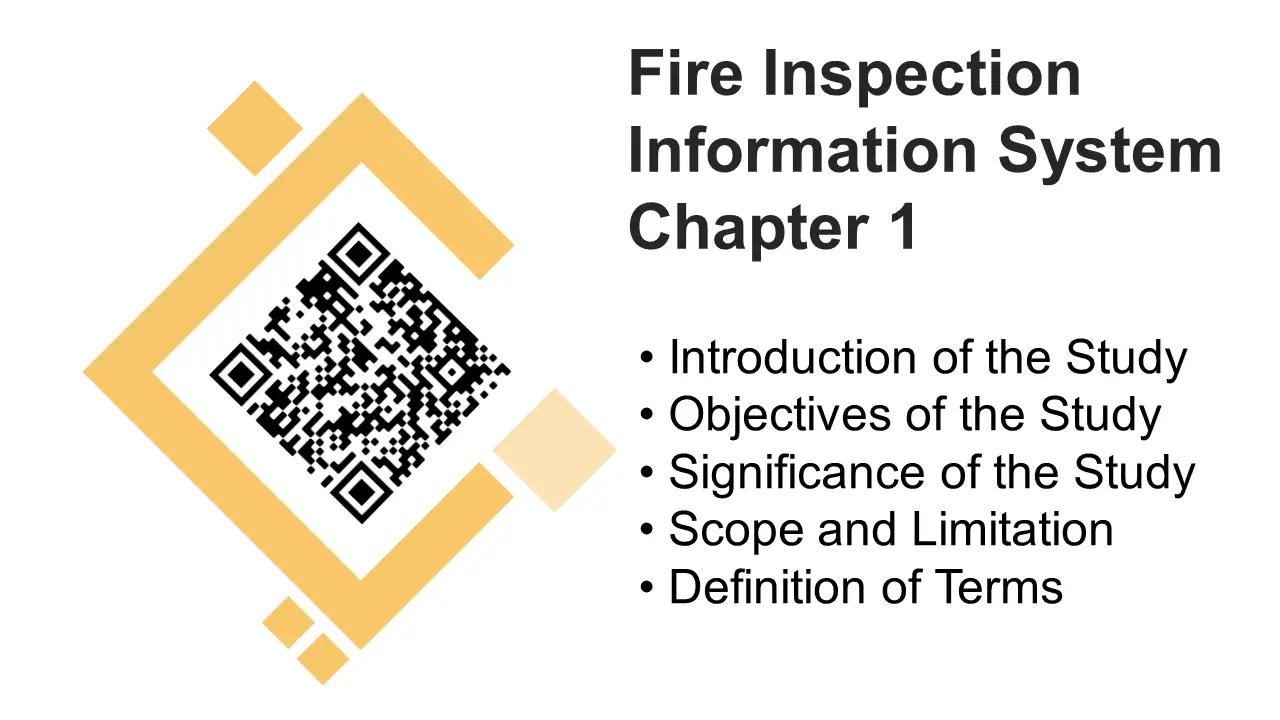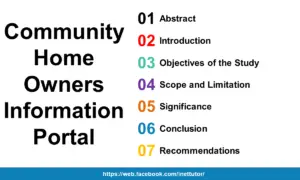Fire Inspection Information System Chapter 1
CHAPTER I
INTRODUCTION
This article discusses the introduction, objectives of the study, scope and limitation, significance of the study and definition of terms.
According to the City Bureau of fire Protection, they envision a modern fire protection agency working towards a safe and progressive society. To prevent and suppress destructive fire; investigate its cause; provide emergency medical and rescue services; and enforce other fire related laws with an active involvement of a community is their mission. A lot of efforts are spent in order to sustain, support and maintain the needs of the community especially in City. The BFP just like other government agencies, they monitor buildings, establishments and residences. Monitoring records and updating ones particular files are becoming tedious because of the present manual system used by this agency. The proposed A Web-based Information System of City Bureau of Fire Protection is specifically designed for the benefit of the City BFP Officials and the applicant for permit. Chief operation or Collecting Agent, Chief Administrative, Fire Marshal and the Applicant are the beneficiaries of this proposed system.
Their current FSIC System (Fire Safety Inspection Certificate) uses logbook to record data, manual computation of fire code fees, slow scanning of record, increase number of paper works, slow processing of certification due to the unreliable data.
The purpose of Bureau of Fire Protection FSIC will have the fallowing features such as: Efficiency recording data, convenient storage of data record, Reliable data record, flexible terms in adding record, Speed in viewing and searching data record, Speed in processing certification, Flexible terms computing fire code fees.
This study aims to make a Bureau of Fire Protection FSIC System which enables Bureau of fire Protection Personnel record data easily.
Through this propose System it provides a hands free work, easy and fast recording data record, and increases number of release certification and provide reliable fire code fees report.

Objectives of the Study
The researcher aims to design, develop and implement a Web-based Information System for City Bureau of Fire Protection.
It specifically aimed:
- To convert most of the paper based transactions into an online system such as the:
- Online application
- Monitoring of application
- Report generation
- To test and evaluate the system using the McCall’s Software Criteria.
- To evaluate the system based on the ISO Quality Model in Use.
Significance of the study
The results of the study will be beneficial to the following:
Chief Operation/Collecting Agent. It helps for the chief operational collecting agents for it allows easy and convenient inputting, viewing, checking and keeping records. Also it allows easy viewing of unpaid FSIC, and managing financial planning.
Chief Administrative. It helps for the chief administrative for it allows easy viewing, checking and preparing data records.
Fire Marshall. It helps for the fire Marshall for it helps in terms of decision making.
Establishment. It helps for the Establishment to easy searching for their records and accounts.
Future Researchers. It helps for the Future Researcher for it can be their basis for their future system to be developed soon.
Residents. It helps for the Resident for easy application of permit.
Scope and Limitation
The system will stores multiple records of establishments specifically in City which is required to get a Fire Safety Inspection Certificate in order for their establishment to operate. It also allows multiple viewing and checking of statement of account of establishment. It also generates Geographic Information System of different establishment in City that allows them to help in regards with decision making.
A web-based Information System for City Bureau of Fire Protection is created to support this kind of problem. Such as: Manual recording of data in a log book, Manual computation of fire code fees, Slow scanning of record, Slow processing of certification due to unreliable data, Inflexible terms in adding record, Speed in viewing and searching data record, Speed in determining the status of establishment such as: with FSIC, without FSIC and subject to inspection and the capacity of the current system to support decision making.
Definition of Terms
The following terms are defined conceptually and operationally to understand the main focus of the study:
Accidental Fire – it refers to the fire that cause where human action is involved directly or indirectly
In this study, it is the most common fire that occurs with the negligence of a human.
Bureau of Fire Protection – (Filipino: Kawanihan ng Pagtatanggol sa Sunog) is an agency of the Department of Interior and Local Government (DILG) responsible for implementing national policies related to Firefighting and Protection as well as implementation of the Philippine Fire Code (PD 1185).
Firefighting facilities and equipment– it refers to the different tools and equipment used during fire outbreak to suppress it to avoid further destruction on life and property.
Fire Prevention– in this study, it refers to the precautionary measures undertaken to eliminate the fires to avoid greater injury, loss of life and property.
Fire Outbreak– in this study it refers to the fire accidents or the spread of fire through a particular area which endangers life and property.
Fire code – set of standards established and enforced by government for fire prevention and safety in case of fire as in fire escapes.
Decision Support System –a set of related computer programs and the data required to assist with analysis and decision-making within an organization.
Geographic Information System – Is a system designed to capture, store, manipulate, analyze, manage, and present all types of spatial or geographical data.
Permit –a written warrant or license granted by one having authority.
Fire Prevention Month – is an annual nationwide observance held every march in the Philippines.
Computer Program – is a list of instruction that tell a computer what to do. Is a sequence, stored in any medium, that can be interpreted and executed by a computer.
Investigate – to try to find out the facts about(something such as crime or an accident) in order to learn how it happened, who did it etc.
Monitoring – is a systematic and routine collection information from projects and programmers for four main purposes.
-is a periodically recurring task already beginning in the planning stage of a project programmer.
Residence – committed to love and work in specific place, often for a certain length of time.
– the place in which reside abode or home.
Credits to the authors of the project.
You may visit our facebook page for more information, inquiries and comments.
Hire our team to do the project.


